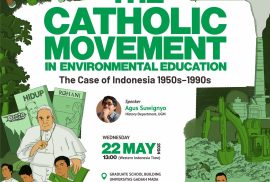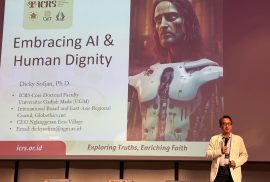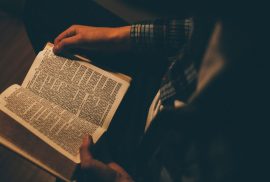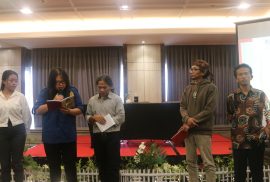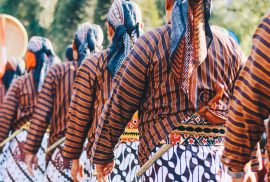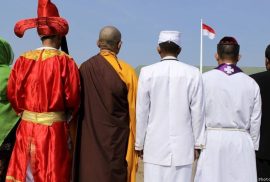Dicky Sofjan
Indonesian Consortium for Religious Studies (ICRS) & Universitas Gadjah Mada (UGM)
What would religion and religious life be like in the age of Generative Artificial Intelligence (GAI)? What would the Internet of Things (IoTs), ChatGPT, Blockchains, A/V Reality, and all these futuristic technologies such as Machine Learning Systems (LMS) and Robotics Engineering have to do with the humankind’s “ultimate concern,” borrowing Scott Appleby’s (2000) notion?
These questions were constantly badgering me immediately when I received a startling invitation by the Digital Communications Network (DCN) early this year to become one of the keynote speakers in its Web3 Fusion: AI and Beyond forum in Bangkok, Thailand. The event, held on April 14-16, was described as “a hybrid forum on technologies impacting the information space.” The forum was intended as a platform to learn, share insights, and build networks among young or youthful tech engineers, developers, digital platform company representatives, academics, non-governmental organizations, and youth from around the world. Other invited keynote speakers included those from the United States, Brazil, Greece, the United Kingdom, New Zealand, Japan, Korea, Thailand, Malaysia, and the Philippines.
Hongsok Lee
The Wednesday forum, held on February 28, 2024, at the Graduate School Building of Universitas Gadjah Mada, was an interesting presentation entitled “The Joke is on Me (God).” The speaker, Prof. Robert Setio, is the Dean of the Faculty of Theology at Universitas Kristen Duta Wacana and a faculty member of the Indonesian Consortium for Religious Studies.
The presentation began by listening to the song “I started a Joke” by the Bee Gees together and discussing the meaning of the lyrics. The presenter went on to quote Søren Kierkegaard on irony: “Irony limits, finitizes, and circumscribes and thereby yields truth, actuality, and content; it disciplines and punishes and thereby yields balance and consistency.” Through his examination of the role that humor about God can play in uncovering the irony of religion and the meaning of humanity, he argues that humor about God can be a good tool for understanding the complexity and diversity of religion and humanity.
Rezza Prasetyo Setiawan
Center for Religious and Cross-cultural Studies, Universitas Gadjah Mada
Religions co-constitute parts of the Earth’s history and they continue to influence the current state of the world. Religions exist not only in thoughts or words, but also in actions, all of which reverberate far beyond human perception and understanding. Therefore, the significant role of religions in co-constituting reality should not be limited only as a means to explain the current state of marginalization and oppression but also as a force of change against injustice. This article will reframe the Marxist understanding of interreligious engagement that is based upon a conventional materialism within the neo-materialist paradigm to expand the understanding of interreligious engagement as entanglements of material-discursive struggle against capitalist homogenization.
Athanasia Safitri
Religion and Global Society in collaboration with the London School of Economic and Political Sciences (LSE) and the Indonesian Consortium for Religious Studies (ICRS), held a workshop event entitled “Agama Menghadapi Perubahan Lingkungan” (Religion Dealing with Climate Change). It was supported by the British Embassy in Jakarta and held in Solo on March 18, 2024. Twenty-two participants come either from religious communities or environment-based organizations in the Yogyakarta and Surakarta regions.
m rizal abdi
Center for Religious and Cross-Cultural Studies
The end of March 2024 becomes an important week for religious communities in Indonesia. During the week, we experience several holy days in sequence: Nuzulul Qur’an Day for Muslims and three holy days (Maundy Thursday, Good Friday, and Easter Sunday) for Christians. The unique event is not merely a coincidence due to the rare meeting of two calendar modes that will not happen for many years to come. For Muslims and Christians in Indonesia, this is a momentous opportunity to deepen interfaith understanding and re-learn from one another.
Athanasia Safitri
The latest edition of Wednesday Forum discussed Kejawen on 20 March 2024 by Dylan Renca, a doctoral candidate and teaching fellow in cultural anthropology at Boston University, USA. His research focuses on Javanist voices of ethical selfhood, belonging, and multicultural recognition. His ethnographic fieldwork is taking place in the Banyumas-Cilacap region of Central Java. He argues that most Javanists (later to be called Kejawen) today position themselves along a spectrum between Indigeneity and Islam, with diverse practices of ethical self-formation. He seeks more evidence that some Kejawen orient themselves and their practices around Islamic precepts and ways of being, while others articulate indigenous positions based on non-Islamic ontologies.
Athanasia Safitri
The first Wednesday Forum in March was carried out by an alumna from The Center for Religious and Cross-Cultural Studies (CRCS) UGM on March 6. Leyla Adrianti Hermina talked about how youth may use religion as a coping mechanism and presented the results of her thesis research. She opened with the question “Do Youth Turn to Religion As a Coping Mechanism?” as she wanted the audience to start their self-examination as to whether religion could be a solution amidst many problems youth are facing. She started by stating that according to Varkey Foundation (2017), Indonesian teenagers are ranked as the happiest as a result of their strong religiosity in 20 countries.
Athanasia Safitri
The Wednesday Forum discussion series came back for its first session in 2024 on February 21 with Prof. Dr. Martin Rötting giving a talk on his research about spirituality in plural societies. Rötting is an Associate Professor and head of the Religious Studies program at the Centre for Intercultural Theology and Study of Religions at Paris-Lodron University of Salzburg, Austria. His empirical study seeks to answer the question of how spiritual identity may develop in the personal journey and interreligious world. The research explores the changes of individuals and religious organisations through field research in Munich, Seoul, Vilnius, and New York.

